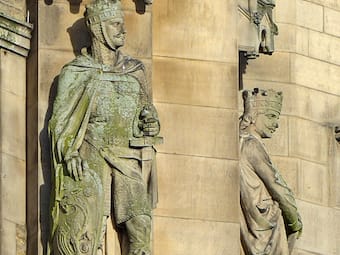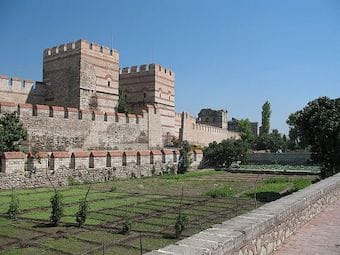Guimond likened taking a job in William’s forcibly Norman-culture English Church to a man grasping handfuls of charcoal from a red-hot brazier. Although the English and French churches were both Latin-rite churches governed by Rome, their histories were markedly different. The English had maintained closer contacts with Greece and Russia; they lovingly kept the memory of English, Welsh, Scottish and Irish saints; they preached in English, and esteemed English writers; their chant was peculiarly English; and the lower English clergy, like their Eastern counterparts, were accustomed to marry. Norman abbots and Bishops swept this away, sometimes at sword-point, always with arrogance and contempt. Guitmond believed that to take hold of this raging bonfire of English things could only burn a good man’s hands.
“Every ecclesiastical election onght to be purely made in the first instance by the society of the faithful who are to be governed, and then confirmed by assent of the fathers of the church and their friends, if it be canonical; if not, it should be rectified in a spirit of charity. How can that which you have wrung from the people by war and bloodshed be innocently conferred on myself and others who despise the world and have voluntarily stripped ourselves of our own substance for Christ sake?
“It is the general rule of all who take religious vows to have no part in robbery, and, for the maintenance of justice, to reject offerings which are the fruits of pillage. For the scripture saith: ‘The sacrifice of injustice is a polluted offering’; and a little afterwards: ‘Whoso offereth a sacrifice of the substance of the poor is like one that slayeth a son in his father’s sight.’* Reflecting on these and other precepts of the divine law, I cannot but tremble. I look upon England as altogether one vast heap of booty, and I am afraid to touch it and its treasures as if it were a burning fire.”
* See Ecclesiasticus 34:18-20: He that sacrificeth of a thing wrongfully gotten, his offering is ridiculous; and the gifts of unjust men are not accepted. ... Whoso bringeth an offering of the goods of the poor doeth as one that killeth the son before his father’s eyes.
Questions for Critics
1. What is the author aiming to achieve in writing this?
2. Note any words, devices or turns of phrase that strike you. How do they help the author communicate his ideas more effectively?
3. What impression does this passage make on you? How might you put that impression into words?
Based on The English Critic (1939) by NL Clay, drawing on The New Criticism: A Lecture Delivered at Columbia University, March 9, 1910, by J. E. Spingarn, Professor of Comparative Literature in Columbia University, USA.
Précis
The appointment of a clergyman, continued Guitmond, was traditionally handled by the community he was to govern, not by others; and in any case, those who had renounced worldly glory could not serve those who lived for it. Scripture assures us that the spoils of war are an offering repugnant to God, and perilous to the hand that touches it. (60 / 60 words)
The appointment of a clergyman, continued Guitmond, was traditionally handled by the community he was to govern, not by others; and in any case, those who had renounced worldly glory could not serve those who lived for it. Scripture assures us that the spoils of war are an offering repugnant to God, and perilous to the hand that touches it.
Variations: 1.increase the length of this precis to exactly 65 words. 2.reduce the length of this precis to exactly 55 words. 3.introduce one of the following words into the precis: although, must, or, otherwise, ought, unless, whereas, whether.
Archive
Word Games
Spinners Find in Think and Speak
For each group of words, compose a sentence that uses all three. You can use any form of the word: for example, cat → cats, go → went, or quick → quickly, though neigh → neighbour is stretching it a bit.
This exercise uses words found in the accompanying passage.
1 Afraid. Little. Society.
2 Reject. Scrutiny. War.
3 Body. Salvation. Take.
Variations: 1. include direct and indirect speech 2. include one or more of these words: although, because, despite, either/or, if, unless, until, when, whether, which, who 3. use negatives (not, isn’t, neither/nor, never, nobody etc.)
Adjectives Find in Think and Speak
For each word below, compose sentences to show that it may be used as an adjective. Adjectives provide extra information about a noun, e.g. a black cat, a round table, the early bird etc..
This exercise uses words found in the accompanying passage.
1 Careful. 2 Careless. 3 Detailed. 4 Lawful. 5 Wretched. 6 Vast. 7 Faithful. 8 Mean. 9 Fruitless.
Variations: 1.show whether your adjective can also be used as e.g. a noun, verb or adverb. 2.show whether your adjective can be used in comparisons (e.g. good/better/best). 3.show whether your adjective can be used in attributive position (e.g. a dangerous corner) and also in predicate position (this corner is dangerous).
Statements, Questions and Commands Find in Think and Speak
Use each word below in a sentence. Try to include at least one statement, one question and one command among your sentences. Note that some verbs make awkward or meaningless words of command, e.g. need, happen.
This exercise uses words found in the accompanying passage.
1 Err. 2 Fall. 3 Make. 4 Look. 5 Confirm. 6 Drive. 7 People. 8 Burn. 9 Struggle.
Variations: 1. use a minimum of seven words for each sentence 2. include negatives, e.g. isn’t, don’t, never 3. use the words ‘must’ to make commands 4. compose a short dialogue containing all three kinds of sentence: one statement, one question and one command
High Tiles Find in Think and Speak
Make words (three letters or more) from the seven letters showing below, using any letter once only. Each letter carries a score. What is the highest-scoring word you can make?
Your Words ()
Post Box : Ask Nicholas
Grok : Ask Grok
You are welcome to share your creativity with me, or ask for help with any of the exercises on Clay Lane. Write to me at this address:
See more at Post Box.
If you like what I’m doing here on Clay Lane, from time to time you could buy me a coffee.
Buy Me a Coffee is a crowdfunding website, used by over a million people. It is designed to help content creators like me make a living from their work. ‘Buy Me a Coffee’ prides itself on its security, and there is no need to register.
Related Posts
Two monks vying for the abbot’s chair at one of England’s prestigious monasteries each promised King William Rufus handsome rewards for his favour.
Picture: © Tim Green. 2.0.. Source.
Posted July 24 2021
Picture: By Nicholas Roerich (1874-1947), Wikimedia Commons. Licence: Public domain.. Source.
Posted March 25 2020
In Constantinople, capital of the Roman Empire, a man from Kent founded a glittering church for English refugees.
Picture: © Niels Elgaard Larsen, Wikimedia Commons. Licence: CC BY-SA 2.0 generic.. Source.
Posted March 24 2020
After the Norman Conquest, thousands of disappointed Englishmen departed for a new life in the Byzantine world.
Picture: Photo by CrniBombarder!!!, Wikimedia Commons. Licence: Public domain.. Source.
Posted April 4 2016





